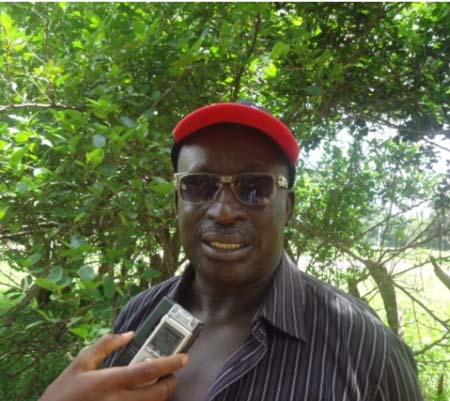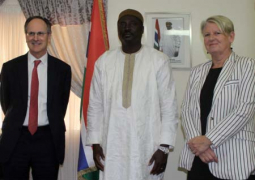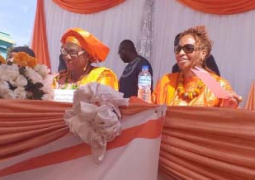
He lamented that without the proper management of the forest cover, agriculture would find it very challenging to succeed in achieving high yield in crop production and productivity, especially for farm produce.
Therefore, he added, to realize a meaningful agricultural development, there must be a healthy forest cover that would help to ensure that agriculture achieve its vibrant markets in terms of farm produce.
Kanimang Camara was speaking over the weekend at the end of a massive tree-planting of cashew (gmelina), another indigenous spices conducted at Sotokoi National Forest Park.
The exercise was funded by Forest and Farm Facility through the support of Food and Agricultural Organization (FAO), which was jointly implemented by the National Environment Agency, Forestry Department and the community in the three regions, Lower River Region, North Bank Region and West Coast Region.
The National Environment Agency teams were also on trek to Lower River Region and North Bank Region for the same purpose in the exercise, and planted hundreds of seedling at Sotokoi National Forest Park and Sotokoi Lower Basic as part of their pilot area.
Mr Camara also asserted that since agriculture and the forest are inter-related, then there is need for collective effort by all and sundry in protecting these natural resources for the benefit of the future generation.
He said this led to FFF joining the crusade in planting more trees in the regions as part of their contribution to national development for the benefit of future generation.
The national facilitator of Forest and Farm Facility, Mr Camara, explained that FFF had some targeted activities to implement during this year’s rainy season.
He acknowledged that some of their activities and plans included tree planting in their piloted area which includes West Coast Region, Lower River Region and North Bank Region.
He also recognised the importance of sustainable agriculture of which FFF deemed its very fitting in supporting the National Farmer Platform of The Gambia by providing funding for them to conduct a field trip to see good practice of farming, as well as forestry activities during the rainy season.
“We are also targeting to train the Bee Keepers with technical skill through the National Bee Keepers Association for young people involved in the production of bee for the purpose of self-reliance,” he said.
According to the national coordinator of FFF, they would be opening a small grant at the end of this month where they would call for proposal both for forest and farm producers’ organization to apply for grant of the Forest and Farm Facility (FFF).
He further added that it was part of their plan to conduct training for women in salt production in the Fonis, Kombo North in the West Coast Region.
Mr Camara further emphasised that FFF had planted over 3000 seedlings and some of the seeds planted are Cashew and Gmelina seeds and other indigenous pieces.
He said this year, FFF, in collaboration with their development partners, would plant trees close to a million tree pronounced by the President.
He noted that meeting the said target of one million treescalls for collective collaboration with all stakeholdersincluding NGOs with technical advice from the department of forestry to ensure that the dream become a reality.
He further explained that FFF is aiming at achieving three goals to ensure that producers groups both from forest and farm are strengthened through policy dialogue, to strengthen the farmer to have access market potential of some of the products.
He said they would also continue to support government across sectoral coordination through the NEA so they could effectively deliver their mandate.
He also commended the Food and Agricultural Organization (FAO), the International Union for the Conservation of Nature, as well as the International Institute for Environmental Development and the World Bank for supporting Forest and Farm Facility.
He also highlighted some of the achievements the FFF had registered so far, thus one of the achievements is supporting government to formulate user friendly policy.
According to him, forest and agriculture are inter-related, noting that without good forest cover agriculture could not be effective.
Sheikh Alkinky Sanyang, Environmental Education and Communication officer NEA, said tree planting in the forest was part of recovering the forest lost tree and animal.
He said NEA is always partnering with the foresters in The Gambia to support re-forestation as part of national development, as well as replacing the lost trees
Read Other Articles In Article (Archive)

Foreign Minister Tangara receives UK’s envoy to the Commonwealth
Mar 2, 2020, 12:30 PM
Alleged cement theft case continues
Feb 9, 2011, 1:19 PM


